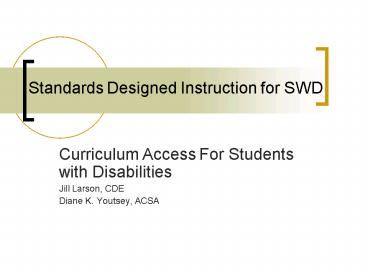Standards Designed Instruction for SWD - PowerPoint PPT Presentation
1 / 27
Title:
Standards Designed Instruction for SWD
Description:
Standards are general statements of what all students should know and be able to ... Tie the IEP to the general education curriculum ... – PowerPoint PPT presentation
Number of Views:79
Avg rating:3.0/5.0
Title: Standards Designed Instruction for SWD
1
Standards Designed Instruction for SWD
- Curriculum Access For Students with Disabilities
- Jill Larson, CDE
- Diane K. Youtsey, ACSA
2
Steps to Designing Standards-based Instruction
Step 1. STANDARDS
Step 2. ASSESSMENT
Step 3. STANDARDS-BASED IEPS
Step 4. MASTERY TEACHING AND LEARNING
3
Standards Based Education
- What do we know about standards-based
education? - Standards are general statements of what all
students should know and be able to do. - Benchmarks are key checkpoints that monitor
student progress toward meeting the standards.
4
Selected Standards
- Selected Standards identify specific content
critical to the students successful progress
through the California Content Standards
5
Selected Standards
- The standards chosen for the ACSA handbook were
selected using - Special Education Professionals from throughout
the State. - The Blue Print.
- http//www.cde.ca.gov/ta/tg/sr/blueprints.asp
6
Selected Standards
- Tie the IEP to the general education curriculum
- Provide positive directions for goals and
interventions
7
Selected Standards
- Satisfy general curriculum requirements of IDEA
- Focus on the curriculum elements that help
students prepare for the State STAR assessments
8
Assessment Interpreting the Data
9
CDE STAR Assessment System
- CAT 6
- CST
- SABE
- CAPA
10
Assessment Results Provide Information
- Opportunity to problem solve and implement new
strategies - Teacher training
- Instructional materials
- Devote more time to specific content
- Confirmation that strategies work
11
Assessment Results Provide Information
- Assessment results provide information that
allows a district, school or state officials to
focus resources on - Which individual?
- Which subgroup?
12
Assessment Results Provide Information
- Assessment results provide information that
allows a district, school or state officials to
focus resources on - What content areas?
- What grade?
13
Principles of Good Practice for Assessing Student
Learning
- Assessment of Student learning begins with
educational expectations - Assessment works best when programs have clear,
explicitly stated purposes - Assessment works best when it is ongoing and not
episodic
14
What is Educational Benefit?
- Specifically designed instruction will be
provided for eligible students to address the
unique needs of the child that result from the
childs disability and to ensure access of the
child to the general curriculum so that he or she
can meet the educational standards that apply to
all children.
15
Educational Benefit
16
What is Educational Benefit?
- Is the assessment complete and does it identify
the students needs? - Does the present performance include all of the
needs identified in the assessment? - Are all of the students educational needs
addressed by appropriate goals and objectives?
17
What is Educational Benefit?
- Do the services support goals and objectives?
- Did the student make yearly progress?
- If the student did not make yearly progress
- Services Provided, IEP reasonably calculated,
Goals and Objectives, Services changed
18
Developing Standards-based IEPs
Choosing Grade Level Standards for Special
Education Students
19
Trellis Strategy
- A trellis is defined as a frame used especially
as a support for climbing plants. - The trellis metaphor is used in conjunction
with the teaching of standards. - We will use the term trellis as a frame used to
support children functioning below grade level
state or district standards.
20
Trellis Strategy
- As the learner gradually masters one grade level
standard, climbing on to the next grade level
standard is possible. - Trellising a standard cannot be accomplished
without assessment and appropriate goals and
objectives/benchmarks.
21
Trellising Sample
- 9.1.9 Revise writing to improve the logic and
coherence of the organization and controlling
perspective, the precision of word choice, and
the tone by taking into consideration the
audience, purpose, and formality of the context. - 8.1.6 Revise writing for word choice appropriate
organization consistent point of view and
transitions between paragraphs, passages, and
ideas - 7.1.7 Revise writing to improve organization and
word choice after checking the logic of the ideas
and the precision of the vocabulary. - 6.1.6 Revise writing to improve the organization
and consistency of ideas within and between
paragraphs. - 5.1.6 Edit and revise manuscripts to improve the
meaning and focus of writing by adding, deleting,
consolidating, clarifying and rearranging words
and sentences. - 4.1.10 Edit and revise selected drafts to improve
coherence and progression by adding, deleting,
consolidating, and rearranging text. - 3.1.4 Revise drafts to improve the coherence and
logical progression of ideas by using an
established rubric.
22
Develop the Annual Goal
- ANNUAL GOALS are statements that describe what
the student can reasonably accomplish within a
twelve-month period.
23
Write Goals and Objectives/Benchmarks
- In writing objectives/benchmarks it is
important to use verbs that are open to few
interpretations and that require an overt,
observable action, i.e. - write solve
- demonstrate synthesize
- define construct
- read compare
24
Components of Goals Objectives/Benchmarks
- WHO (Student)
- DOES WHAT (Observable Behavior)
- WHEN (By Reporting Period)
- GIVEN WHAT (Conditions)
- HOW MUCH (Mastery,criteria)
- HOW WILL IT BE MEASURED
- (Performance data)
25
Designing Standards-based Instruction
- Know the standards
- Know the student
- Review assessment results
- Review Cum
- Consider strengths and weaknesses
- Establish present levels using formal and
informal assessments
Adapted from Ohio State Department of Education
26
Designing Standards-based Instruction
- Connecting the IEP to the Content Standards
- Prioritize needs
- Align needs to standards and write goals
- Trellis
- Unlock the standards
- Accommodations and modifications
- Assess throughout the year
Adapted from Ohio State Department of Education
27
Designing Standards-based Instruction
- Planning Instruction
- Identify interim assessments
- Researched-based instructional strategies
- Differentiate instruction
- Use standards-based materials and resources































